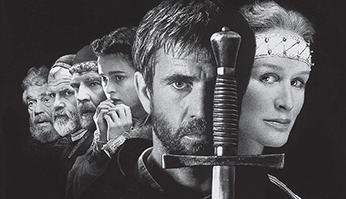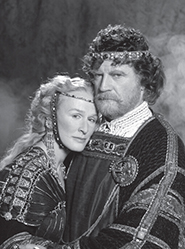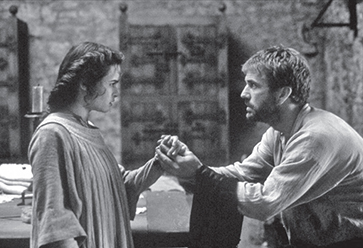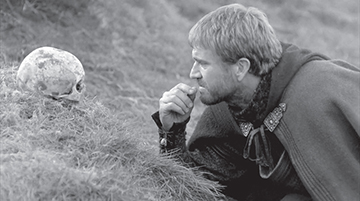

Hamlet and the Ghost
Samuel T. Goldberg
Bruce H. Sklarew, Film Editor
Samuel T. Goldberg, M.D., is a training analyst at the Washington Baltimore Center for Psychoanalysis and a member of the Center for Advanced Psychoanalytic Studies. He has presented papers on the tragedies of William Shakespeare at the Folger Shakespeare Theater and elsewhere.
Bruce H. Sklarew, M.D., an associate editor and co-founder of the award-winning Projections: The Journal for Movies and Mind, organizes the film programs at meetings of the American Psychoanalytic Association and has co-edited two books on psychoanalysis and film.

Samuel T. Goldberg
Mel Gibson’s movie, “Hamlet,” presents that ambiguous tragedy most beautifully. Hamlet’s father, the king of Denmark, has been secretly murdered by Claudius, who thereby has gained not only the throne, but also Gertrude, the queen. Prompted by his father’s ghost to avenge this villainy, Hamlet yet cannot bring himself to act. What holds him back?
Let’s view this enigma through the particular lens of Hamlet’s ambivalence toward his father, and how to respond to Father’s command: abject submission or determined opposition? Like Claudius when he is praying for forgiveness, Hamlet’s conscious intention to fulfill Father’s expectation is defeated by conflicting factors within. He arrives at an unconscious compromise, to resist passive-aggressively, by procrastinating and failing at what Father wants him to do.
The nobles of Denmark have accepted the new king and Gertrude’s hasty remarriage. Hamlet feels betrayed, helpless, and depressed. So intense is his longing to be reunited with Father again, so vivid his memory, that this wish becomes nearly a vision, a momentary denial of his father’s death: “My father! Methinks I see my father!” Yet, noting how quickly the wedding followed the funeral, Hamlet had just said, “Would I had met my dearest foe in Heaven or ever I had seen that day.” That immediate sequence of thoughts suggests, to Hamlet, his father is his “dearest foe,” whom he both dearly loves and with whom he could fight to the death. This one phrase encapsulates Hamlet’s ambivalence.
From the outset, Hamlet idealizes his father: “So excellent a King … A Hyperion.” He later bestows upon Father the highest Olympian graces: “The front of Jove himself … a form indeed where every god did seem to set his seal.” Hamlet has not permitted his image of Father to slip from divine perfection, the hero he would emulate, whose competence and grandeur he would borrow and incorporate. This idealizing relationship, however, asserts a specific image not only of the dead king, but also of the prince: though adoring and devoted, he also must remain young and weak.
Emphasizing perceptions that are exclusively positive, Hamlet avoids guilt by repressing criticism of or aggression toward his father, manifestly a victim who was killed. To both relinquish the idealization and accept his father as truly gone would require painful mourning. Father dead, in the dust, leaves open the possibility that Hamlet, who still lives to see the majestic overhanging firmament, could surpass him; Hamlet cannot permit any sense of triumph. Unable to de-idealize Father, he has difficulty tolerating imperfections in himself and others.
The idealizing relationship is brought violently to question, however, when Hamlet first encounters the dead king’s ghost. Indeed, the ghost is so ambiguous in appearance that Hamlet, shaken to his depths, questions whether it comes from Heaven or from Hell. On both occasions that he sees it, his first words are not to the ghost itself, but to divine beings, asking for protection: “Angels and ministers of grace defend us!” and later, “Save me, and hover o’er me with your wings, you Heavenly guards!” In the movie, Gibson on each occasion makes a cross, to shield himself.
The ghost tells Hamlet he “could a tale unfold whose lightest word would harrow up your soul,” i.e., drive him into madness, and “make your two eyes like stars start from their spheres,” i.e., become “out of joint.” Far from Hyperion virtue, the ghost admits to “foul crimes done in my days of nature.”

Learning of the murder, Hamlet’s first words are, “Haste to me know’t, that I with wings as swift as meditation or thoughts of love may sweep to my revenge.” He thus reveals his own unwarlike character: Meditation and thoughts of love hardly connote sweeping ruthless revenge. Though distinctly unsuited to the task, Hamlet is eager to please his father, to do his bidding and secure his approval.
The “warlike” ghost, however, hardly promotes peace and reassurance. He commands Hamlet to murder a king, an act of political revolution that will require Hamlet’s endangering, if not sacrificing, his own life. He coerces his son’s compliance with admonition and threat of reproof: Hamlet is bound to revenge, “If thou dids’t ever thy dear father love … If thou has’t nature in thee.” To neglect the demand would prove Hamlet unloving and unmanly. Acting the compelling authority, manipulative and domineering, the ghost disappears with the words, “Remember me.”
Hamlet feels nearly torn apart by the encounter, appealing to his heart to hold together, to his sinews to hold him up still. And with regard to his mind, the prince says, “Remember thee? Ay, from the table of my memory, I’ll wipe away … all pressures past that youth and observation copied there, and thy commandment all alone shall live within the book and volume of my brain.”
To his father’s commandment, he commits himself completely. Only the powerful urging of Father will remain inscribed within. In turning over his mind to the ghost alone, Hamlet expresses the submissive element of love for his father, with whom he seeks union. Indeed, he seems at first to gain confidence and security in Father’s dominance, as the ghost convinces Horatio and the guards to “Swear!”

To remember the ghost and carry out his purpose, Hamlet promises with intense passion. Yet it is striking how apt to Hamlet are the warnings of the player king in the Mousetrap play. His wife has just promised, “In second husband, let me be accursed! None wed the second but who killed the first.” The player king responds, “What to ourselves in passion we propose, the passion ending, doth the purpose lose.” Hamlet also has in passion resolved to a purpose, faithfully to remember his father and wreak revenge upon Claudius.
Hamlet, though, may feel his position too analogous to the player queen’s, and killing Claudius proof of weakness and submission. After all, when he first berates himself for not yet having acted, he calls himself a rascal “unpregnant of my cause … like a whore.” Accepting Father’s commandment may equate unconsciously with having been whored and impregnated by him. Here is a powerful motive to neglect the promise. Struggling against emotional bondage, Hamlet would need to reject any such passive feminine self-image.
Instead, he identifies with the formidable dead king. He castigates the two women in his life, repeating his father’s complaints almost verbatim. Railing against Ophelia for her beauty corrupting honesty and making fools of men, Hamlet sounds much like Father bemoaning Gertrude’s lewdness, in the shape of Heaven, courting virtue. Later, he assails his mother for leaving the “fair mountain” of love for King Hamlet to “gorge” on lowly Claudius. This echoes the ghost’s lamenting his “seeming virtuous queen” “declin(ing) upon a wretch … (to) prey on garbage.” Like the idealization, Hamlet’s assimilating and regurgitating the ghost’s views serve identification, maintaining the paternal bond.

Consciously, it is to defend his father’s honor that Hamlet has decried the brevity of his mother’s love. Now in Gertrude’s private chamber, he hardly notices his own visceral involvement with her carnal functioning, as he decries her “honeying and making love over the nasty sty!” It is at this exact moment the ghost appears to him the second time, a hallucination appearing just then, as if to interrupt the intimacy between mother and son. Abandoning his sexual fury, Hamlet becomes meek and childlike, asking if Father comes “your tardy son to chide, that lapsed in time and passion, lets go th’important acting of your dread command?” To be again the humble son, reminded of his “almost blunted purpose,” sworn to avenge his father and be his loyal ally, renounces and undoes any competitive wishes to be the one stealing Father’s wife.
Even as he pledges allegiance, however, Hamlet has already disparaged the ghost, addressing him as “boy” and “old mole,” allowing that he died “with all his crimes” in full blossom, questioning his trustworthiness. Even after having caught the conscience of the king, proclaiming joyfully his faith in the ghost, Hamlet has hesitated to slay Claudius. This delay triggers the cascade of deaths that culminates in his own. In defeating Father’s purpose, Hamlet must defeat himself also.
For Hamlet to feel the fully responsible, autonomous author of his actions, i.e., with the freedom perhaps not to kill Claudius, would involve conscious criticism of his father, renouncing his ties as the loyal son “bound to revenge,” killing off Father as an authority over his life. By remaining loyal, belittling himself as he idealizes his father, persisting unconsciously in loving his parents incestuously, submitting to his father’s commands even as he must thereby sacrifice himself, walking into the obvious trap which will mean his death, Hamlet evades acknowledging guilt for the unconscious wish to commit emancipatory patricide.

At the very end, aware that the potent poison is quite overcoming his spirit, Hamlet says not “I am dying,” but, as if he’s already also a ghost, “I am dead, Horatio … Thou livest. Report me and my cause aright … and … draw thy breath in pain to tell my story.” He thus reenacts the ghost’s commanding him, now taking the imposing role, from beyond death saying, “Remember me.” He thus dies restating his identification with Father, yet also again opposing him, for his last words are, “The rest is silence.” This is ambiguous. “Rest” may mean “freedom from activity.” If “rest” means “what remains,” however, then Hamlet departs stating, in effect, to die is “not to be.” This is yet another repudiation of his father: Being dead, how could he even exist? Here, to say the least, is a fatal challenge to the ghost’s command.